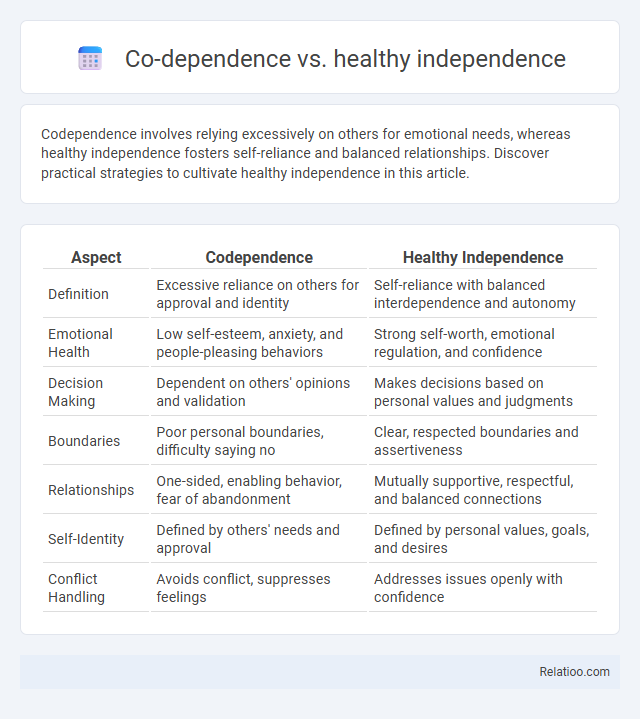Codependence involves relying excessively on others for emotional needs, whereas healthy independence fosters self-reliance and balanced relationships. Discover practical strategies to cultivate healthy independence in this article.
Table of Comparison
| Aspect | Codependence | Healthy Independence |
|---|---|---|
| Definition | Excessive reliance on others for approval and identity | Self-reliance with balanced interdependence and autonomy |
| Emotional Health | Low self-esteem, anxiety, and people-pleasing behaviors | Strong self-worth, emotional regulation, and confidence |
| Decision Making | Dependent on others' opinions and validation | Makes decisions based on personal values and judgments |
| Boundaries | Poor personal boundaries, difficulty saying no | Clear, respected boundaries and assertiveness |
| Relationships | One-sided, enabling behavior, fear of abandonment | Mutually supportive, respectful, and balanced connections |
| Self-Identity | Defined by others' needs and approval | Defined by personal values, goals, and desires |
| Conflict Handling | Avoids conflict, suppresses feelings | Addresses issues openly with confidence |
Defining Codependence: Key Characteristics
Codependence is characterized by an excessive emotional reliance on others, often leading to neglect of your own needs and boundaries. Unlike healthy independence, which balances self-sufficiency with interdependence, codependence involves patterns of enabling, people-pleasing, and difficulty asserting oneself. Strong interpersonal skills help you maintain healthy relationships by fostering clear communication, mutual respect, and emotional resilience.
Understanding Healthy Independence
Understanding healthy independence involves recognizing your ability to maintain self-sufficiency while fostering meaningful connections. Healthy independence balances self-reliance with effective interpersonal skills, enabling you to communicate, set boundaries, and collaborate without losing your sense of self. Developing this balance promotes emotional well-being and supports relationships free from codependence.
Emotional Boundaries: The Crucial Difference
Emotional boundaries distinguish codependence from healthy independence by defining the capacity to maintain personal emotional integrity while engaging authentically with others. Codependence often involves blurred emotional boundaries, leading to excessive reliance on others for validation and identity, whereas healthy independence supports self-awareness and regulated emotional responses without losing connection. Strong interpersonal skills hinge on recognizing and respecting these boundaries, fostering relationships built on mutual respect, empathy, and autonomy.
Signs of Codependent Relationships
Signs of codependent relationships include excessive people-pleasing behaviors, an intense fear of abandonment, and a blurred sense of personal boundaries. Healthy independence fosters self-reliance, clear boundaries, and mutual respect, while strong interpersonal skills enable effective communication and emotional regulation. Recognizing codependency involves identifying patterns of enabling, sacrificing personal needs for others, and difficulty making decisions without validation.
Benefits of Healthy Independence
Healthy independence fosters self-confidence and emotional resilience by allowing individuals to make decisions and solve problems autonomously. It enhances interpersonal skills through balanced relationships where mutual respect and effective communication thrive without excessive reliance on others. Developing healthy independence contributes to overall mental well-being, promoting a strong sense of identity and personal growth.
Impact on Personal Growth and Self-Esteem
Codependence undermines personal growth and self-esteem by fostering excessive reliance on others for validation and decision-making, limiting autonomy and emotional resilience. Healthy independence promotes self-confidence and personal development through accountability and self-reliance, enabling individuals to navigate challenges and build stronger self-worth. Interpersonal skills, such as effective communication and empathy, enhance personal growth by balancing autonomy with meaningful connections, supporting both individual well-being and collaborative relationships.
Communication Styles: Codependence vs Independence
Codependence communication style often involves excessive self-sacrifice, constant seeking of approval, and difficulty asserting personal boundaries, leading to blurred individual identities. Healthy independence promotes clear, honest, and respectful expression of needs and feelings, fostering mutual understanding and personal empowerment without fear of rejection. Effective interpersonal skills balance these styles by adapting communication to maintain connection while preserving autonomy, emphasizing active listening, empathy, and assertiveness in interactions.
Overcoming Codependency Patterns
Overcoming codependency patterns involves recognizing and reshaping behaviors that blur personal boundaries, fostering healthy independence, and enhancing interpersonal skills such as assertive communication and emotional regulation. Developing healthy independence supports self-reliance and decision-making without excessive reliance on others, which is crucial for breaking codependent cycles. Strengthening interpersonal skills enables individuals to form balanced, mutually respectful relationships by addressing underlying emotional needs and promoting effective conflict resolution.
Nurturing Independence in Relationships
Nurturing independence in relationships involves balancing codependence and healthy independence by fostering self-reliance while maintaining emotional connection. Strong interpersonal skills, such as effective communication and boundary-setting, support partners in respecting individuality without sacrificing intimacy. Cultivating this balance promotes mutual growth and resilience, preventing enmeshment and encouraging autonomy within the relationship.
Striking a Healthy Balance
Striking a healthy balance between codependence and healthy independence requires cultivating strong interpersonal skills such as effective communication, empathy, and clear boundary-setting to maintain mutual respect. Your ability to recognize and manage emotional reliance on others without sacrificing personal autonomy promotes healthier relationships and emotional well-being. Prioritizing this balance enhances self-confidence while fostering meaningful connections built on trust and support.

Infographic: Codependence vs Healthy independence
 relatioo.com
relatioo.com